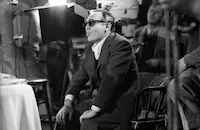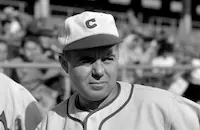The Girl Friend
Cast & Crew
Edward N. Buzzell
Ann Sothern
Jack Haley
Roger Pryor
Thurston Hall
Victor Kilian
Film Details
Technical Specs

Synopsis
Theatrical producer George S. Harmon refuses to produce a musical satire by struggling young actor George Thorne based on the life of Napoleon. He gives back to Thorne what he thinks is his play, but what he actually gives the young actor is a five-act tragedy about Napoleon by someone named "Henry," who has invited the producer to visit him at his farm. Thorne and his friends, Sunshine and Doc Parks, are broke and have no prospects for the summer, so they pretend to be the producer and his entourage and accept the playwright's offer. They live at the farm for two weeks, when Linda, Henry's sister, with whom Thorne has fallen in love, questions why they have not begun production on the play. Thorne claims that there are no theaters available to try out the play, so Henry's grandmother mortgages her farm for three-thousand dollars and converts the barn into a theater. Thorne finally reads the play, and it is terrible. He then tells Linda there are no actors available, but she offers up a variety of local talent. With his back to the wall, Thorne begins to produce his musical satire, telling Henry that it is simply a rewrite of his play. He hopes to have the real Harmon see the play and buy it. On opening night, the production is a hit until a rainstorm strikes, the roof begins to leak and all the displaced animals come in to reclaim their barn. Thorne's plans go further awry when he learns that Harmon never arrived at the theater. When Thorne is finally asked if he is going to buy the play, he admits that he is an imposter. The actor and his friends are forced to leave town, but, at the train station, Thorne runs into the real Harmon, who has come into town for another try-out. When Harmon refuses to see their play, Thorne then pretends to be the producer once more and cancels the other play. Henry kidnaps the cast of the other play and locks them in his barn. Thorne then puts his satire on in its place. Harmon is furious when he arrives at the theater and discovers what has happened. At the first act curtain, he threatens to put the entire company in jail, but Thorne convinces him to let them continue with their production. Henry is cast as Napoleon, and every time the real producer looks at him, he becomes nervous and the audience thinks he is even funnier. The play is a huge success, and Thorne allows all to believe that Henry is its author. Harmon then buys the production as is, and Thorne is once again in Linda's good graces.

Director

Edward N. Buzzell
Cast

Ann Sothern

Jack Haley

Roger Pryor

Thurston Hall
Victor Kilian

Ray Walker
Inez Courtney
Margaret Seddon
Geneva Mitchell
Lee Kohlmar
Elspeth Dudgeon
Lillian Rich
John T. Murray
Victor Potel
Pat West
Al Klein
Sam Fisher
Arthur Rankin
Roger Gray
Billy Nelson
Henry Sylvester
Lon Kay
Bobbie Dale
Harry Mount
Buddy Roosevelt
Vangie Beilby
Bruce Wyndham
Lafe Mckee
Patricia Caron
Betty Dumbries
Meeka Aldrich
Maxine Barbour
Florence Dudley
Marie Astaire
Lucille Day

Marie Wilson
Beatrice Coleman
Doris Davenport
Agnes O'laughlin
Anne Johnson
Billie Van Every
Norma Taylor
Irene Coleman
Shirley Lloyd
Gertrude Von Pein
Monica Bannister
Clarice Sherry
Eleanor Huntley
Dee Dowell
Beverly Royde
Jean Joyce
Doris Carlyle
Ruth Riley
Marbeth Wright
Cleo Cullen
Anya Taranda
Juanita Field
Aileen Covington
Arthur Millett
Charles Marsh
Mark Strong
Matty Roubert
Fred Mayan
Bert Kalmar Jr.
Sumner Getchell
Tommy Hicks
Al Snelling
Patrick Cunning
John Storall
George Ford
Eric Alden
Rod Bacon
Louis Adlon
Sam Rice Jr.
Jack Lubell
Evelyn Pierce
Virginia Meyer
Barbara Hubbard
Peggy Leon
Barbara Cohen
Marie Wells
Ethel Bryant
Rita Donlin
Beth Hartman
Bee Montclair
Corinne Williams
Jeanne Lawrence
Dorothy Shearer
Muriel Scheck
Richard Lancaster
Elizabeth Williams
Crew
Graham Baker
Louise Barnes
Arthur S. Black
Sam J. Briskin
Harry Cohn
Seymour Felix
Arthur Johnston
Gus Kahn
Edna Lyall
Murray Meyer
Gertrude Purcell
John Rawlins
Glenn Rominger
Benny Rubin
Louis Silvers
Gene Towne
Joseph Walker
Ned Winchester

Film Details
Technical Specs

Articles
TCM Remembers - Ann Sothern

TCM Remembers - Ann Sothern
Quotes
Trivia
Notes
According to Hollywood Reporter, Lupe Velez and Jack Benny were originally cast as the leads for this picture in June 1934. In August 1934, Hollywood Reporter reported that filming on the picture had been pushed back by at least four weeks due to re-writes. During that time, Velez went on a personal appearance tour, which later conflicted with the studio's schedule for the film. News items in Hollywood Reporter reported that Velez was called back to Columbia, where she waited two weeks for filming to begin. After that time, Velez collected her check those two weeks, $10,000, and returned to her tour. Columbia, in turn, cancelled payment on the check, and Velez threatened legal action. The outcome of the dispute has not been determined, but neither she nor Benny were involved in the released film. The original director for this project was Russell Mack, whose contract expired during the production delay, and was paid his contractual $15,000 in full. Hollywood Reporter further reported that Columbia had a publicity campaign for the production of the film in June 1934, in which they planned to send studio publicist Carter Ludlow to all forty-eight states in search of buxom milkmaids for a production number planned in the film. Ludlow was to visit each state on a chartered plane, and select one actual farm girl to represent each state in the number. When the film was finally produced in 1935, producer William Rowland, who had been mentioned in the 1934 new items, was no longer associated with it.














